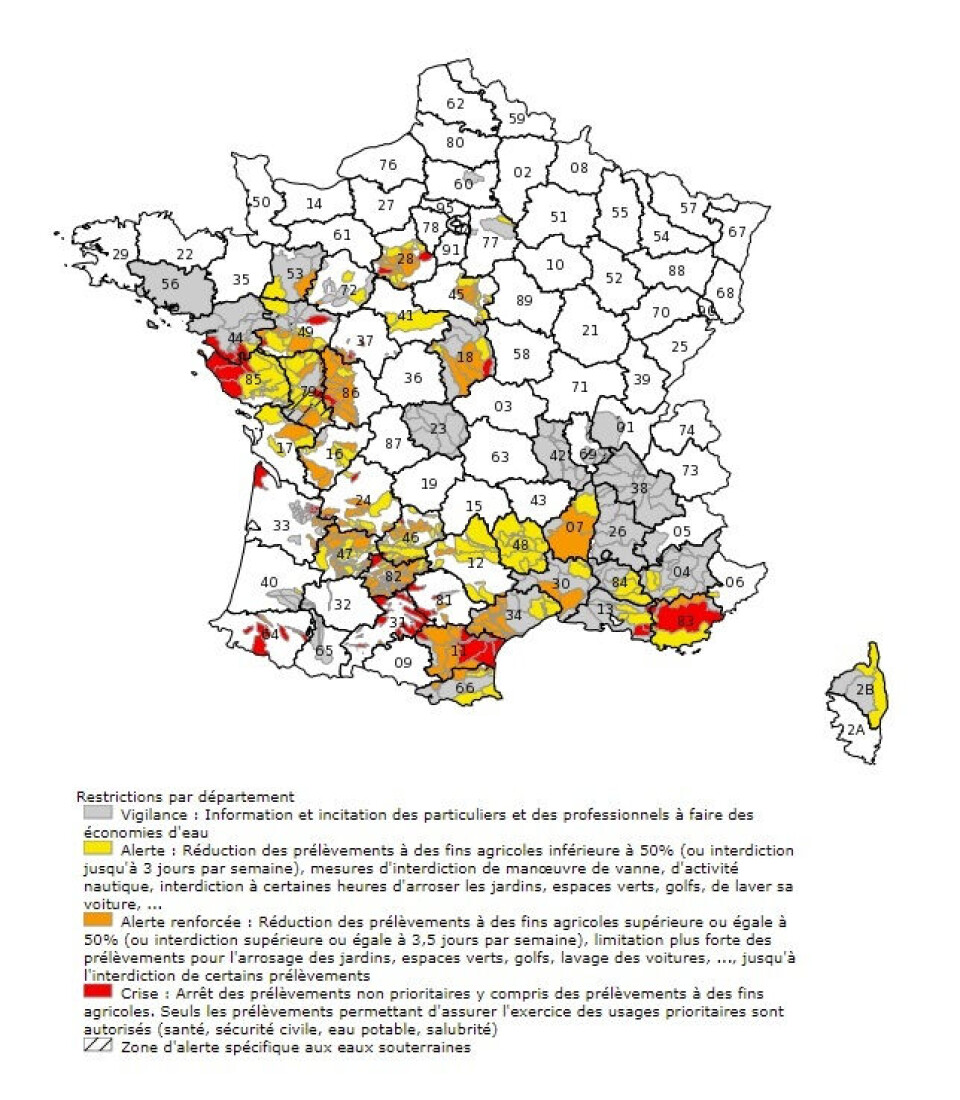-
Rail passenger in France fined €200 for playing music aloud on phone
On-the-spot fine was increased after passenger initially refused to pay
-
House cracking threat spreads to new areas in France, putting 12 million properties at risk
Map from environment ministry shows more than half of country at risk
-
Hospital fees set to increase in France: how will patients be affected?
Plans to save €400 million from social security spending targets several flat fees
Drought alerts for 38 departments in France despite wet summer
Low rainfall over the past few winters means that despite the rainy summer in some areas, the water table is still running dry. Red - the highest ‘crisis’ alert - is in place in several areas
Drought alerts are in place for 38 departments in France despite a rainy summer in many areas, after a series of dry winters mean the water table has not been replenished.
Water restrictions include not watering your lawn, filling swimming pools, using a hose, or washing your car. Depending on the level of drought, there are also restrictions such as no watering of public gardens or spaces such as golf courses.
The highest restrictions (shown in red) mean that water can only be used for important services such as health or firefighting, and for drinking water.
The restrictions for your specific area can be seen on the government website, Propluvia, below.

Farmers in many areas are also subject to water restrictions, after a dry end of August that has threatened the wheat harvest. The situation in Aude is also especially severe, with five times’ less rainfall this year compared to last year.
One wine grape grower told FranceInfo: “The plant cannot feed itself anymore, so automatically, the grape is pulling on the other vegetation.”
The region has since invested in a €2million irrigation system for wine producers, to combat the effects of the drought.
Despite a rainy summer in some areas of the country, the current ‘water tension’ is due to a series of drier-than-average winters. Winter is the only season in which the water table can replenish itself, and without good rainfall during the cooler months, the drought risk increases.
As a result, the spring and summer rain is absorbed by plants, and comparatively less water ends up in the ground.
Dr Emma Haziza, a ‘hydrologist’, specialist in climate change adaptation and founder of research centre Mayane France, told FranceInfo: “We have rain deficits that have been in place since spring, since the rain rarely reaches the water table.
“Over the past four years, we’ve seen that the springtime rain has not always been that effective. This year, they were more so in Grand Est, but not in the rest of France. In the Rhône, Mediterranean, and Provence, all the rain was absorbed by the vegetation, and only very rarely reached the water table.”
Dr Haziza explained that hot weather over summer can worsen the problem, especially in already vulnerable areas. She said that the problem is becoming “less of an exception and more the rule”.
“We have always [normally] had enough rain in winter that allows us to recharge the water table, but we are realising that the rain deficits are getting earlier,” she said. “And as soon as we see spring regrowth, we then have record temperatures. 2020 was France’s hottest year on record.”
Dr Haziza said that the solution to water overuse was to “overhaul the agricultural system”, and the energy industry, which she said were the biggest consumers of water.
And while residents can help, she said, by limiting tap and hose use, domestic water use remains “an extremely moderate share” of the overall water overuse in France, she added.
Related articles
Drought alerts and hosepipe bans in force in south and west France
How climate change will affect major cities in France by 2050
























